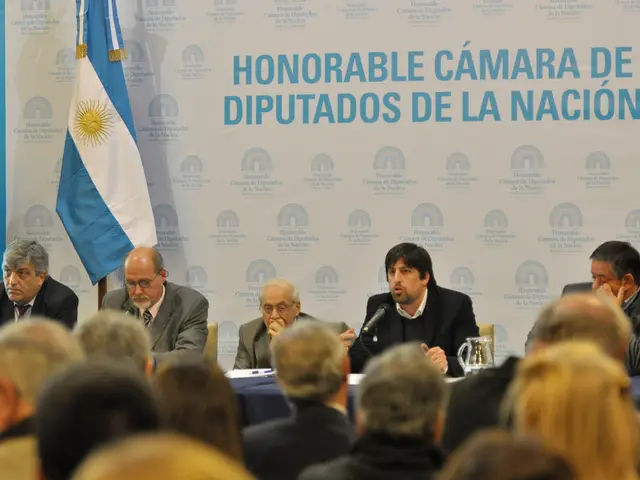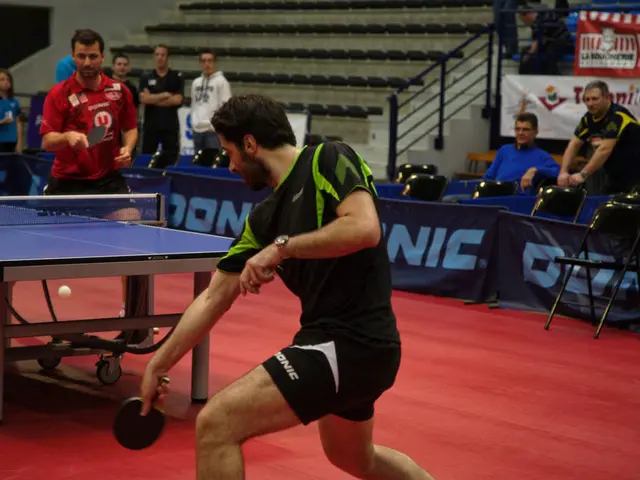American president Donald Trump dismisses potential deployment of U.S. peacekeepers in a security guarantee for Ukraine.
In a significant development, a multifaceted security guarantee for Ukraine is being proposed, coordinated by the United States and European countries. This coalition, known as the "Coalition of the Willing," includes around 30 countries prepared to provide military support to deter further Russian aggression without deploying frontline combat troops [1][2].
The plan, discussed in detail during talks at the White House, involves a "reassurance force" [2]. European nations such as France, the UK, and about 10 others would contribute to this force, providing presence in Ukraine away from active combat zones. The force would focus on training, logistics support, and securing air and sea defense, but U.S. boots on the ground will not be part of the plan, as explicitly stated by U.S. officials [2].
Another key element of the plan is a layered security mechanism, including a civilian monitoring mission patrolling both sides of any peace deal lines of occupation to stabilise ceasefires. This mission might be led by neutral organisations acceptable to both Ukraine and Russia, such as the Organization of Turkic States or the Gulf Cooperation Council [4].
Political backing and guarantees from the U.S. and European states are also crucial to ensure Russia respects any peace deal and refrains from future territorial incursions. Leaders of allied countries would provide visible support for Ukraine’s stance during negotiations [1].
However, due to political opposition, particularly from the U.S. administration under Trump, Ukraine's NATO membership is not part of the short-term plan. Instead, the arrangement relies primarily on a coalition of allied countries committing troops and political support instead of formal NATO guarantees [4].
Russian Foreign Minister Lavrov insists that any security guarantees must include Moscow directly in negotiations and that Russia would veto collective security guarantees involving Ukraine without its consent, reflecting Moscow’s reluctance to accept foreign troops or international forces in Ukraine [1].
Planning teams from countries that want to bolster Ukraine's long-term security will meet with their U.S. counterparts in the coming days. The US has agreed to back security pledges for Ukraine and will play a "coordination" role for European states that would provide "a first line of defence" if fighting ends [3].
US President Donald Trump has ruled out Nato membership for Ukraine and suggested potential help for Ukraine, particularly in the air [5]. Kyiv welcomes the idea of a potential future peacekeeping force for Ukraine, but there is no clarity on its possible size, make-up, or mandate [6].
Russia has repeatedly expressed that western troops in Ukraine in any guise would be unacceptable [6]. European Council President Charles Michel and European Commission President Ursula von der Leyen also took part in a separate briefing on the talks in Washington [7].
British Prime Minister Keir Starmer co-chaired an online meeting on Tuesday to brief more than 30 international leaders about Monday's talks [8]. The discussion comes as diplomatic efforts to secure peace in Ukraine are progressing, with European Council President Charles Michel stating that diplomatic activity is accelerating and there is growing momentum around providing Ukraine with security guarantees [9].
Sources:
- BBC News
- Reuters
- Bloomberg
- Politico
- CNN
- Al Jazeera
- Euractiv
- The Guardian
- Deutsche Welle
Read also:
- Weekly happenings in the German Federal Parliament (Bundestag)
- Southwest region's most popular posts, accompanied by an inquiry:
- Discussion between Putin and Trump in Alaska could potentially overshadow Ukraine's concerns
- Massive 8.8 earthquake hits off the coast of Russia's Kamchatka Peninsula, prompting Japan to issue a tsunami alert.








